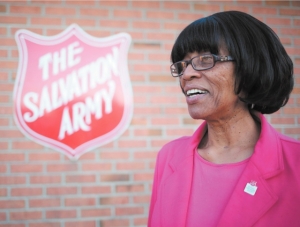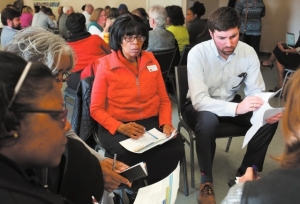Comfort in the shelter
By Becky Barclay
Published in News on March 7, 2018 5:50 AM

News-Argus/CASEY MOZINGO
Janice Sauls stands in front of the Salvation Army sign that hangs outside the men's shelter located behind the main office on William Street. Throughout her years as director of the shelter, Sauls has been able to help shape the lives of many of the homeless in Wayne County.

News-Argus/CASEY MOZINGO
Janice Sauls attends the first meeting of the Poverty Task Force at WAGES in February as a Salvation Army worker.
When Janice Sauls was a young girl -- one of the middle children of 10 siblings -- her family was struggling to survive. One Christmas, they didn't have extras like fruits, nuts and candy like most other children.
"One night about 5 or 6 p.m., there came a knock at the door," she said. "The glee club from Norwayne High School (where her siblings attended) was standing there with a big box of apples, oranges, nuts and chocolate-covered peanuts.
"When I opened that door and saw that, it was like, 'Oh, my God, somebody did that for us?' To me, that pushed me toward helping others. That let me know what it really is all about, helping somebody who needs help."
That desire to help others stayed with Sauls throughout her life, and eventually led her to taking the position of shelter director/agency administrator with the Salvation Army of Wayne County, where the 62-year-old has been since 1999.
But even before that, Sauls had been helping people throughout her life, even in school.
One of her classmates had a birthday party, inviting the whole school. During the party, a heater caught fire, causing the floor to fall through, terrifying everyone and throwing Sauls' classmate into a deep depression because it had happened at her home.
"After that, she would not leave her house or go to school," Sauls said. "She would just sit there and say nothing to nobody.
"The Lord led me to go see her. We talked and talked and she finally began to laugh again, and both of us laughed. I asked her if she wanted to go for a walk and we did. She went on back to school, and we were best of friends. While she was here on earth, she always thanked me for that. It's the little things like that that I often think about."
Sauls said throughout her life, classmates and other people seemed to seek her out for a listening ear -- and sometimes for advice.
"Sometimes the Lord lets me know what to say after they talk to me," she said. "I look to the Lord for direction."
*
That's especially true when working at the Salvation Army. During the day, Sauls can be found in a small office, working with shelter residents. She has to assess everyone who stays at the shelter. She helps them set goals and develop a plan for the rest of their lives.
"We're not just giving them shelter at night, but we're also helping them toward a better future," Sauls said.
"The majority of them are homeless and they're serious about getting a house. Some of them just lost their house and are trying to get back into a house."
Of course, there are always a few who will stay at the Salvation Army shelter as long as they're allowed, then move on to another shelter somewhere else.
"But when they're serious about finding a house and finding work, they get out and do job searches during the day and bring their job search sheets back to us to be filed."
Sauls constantly monitors each man's folder, making sure he's doing what he's supposed to be doing.
"And I tell them while they're out looking for a job, also look for a place where they'd like to live and find out how much fees are for rent and to turn on lights and water," she said. "Then when they land their job, they'll already have where they want to live. Once they find a job, they won't have time to look for housing."
All of this help is to get a man back into a home after he's lost his.
"Some have just lost their job and lost their home or got divorced and the wife got the house," Sauls said. "Some were staying with their parents and their parents died. Their parents were a second income to keep the house going. So when the parents die, they can't keep the house by themselves because a lot of them are on a fixed income."
She recalls a man who came to the shelter in 2007 whose parents had just died, and he lost his home.
"I found out what he really needed," Sauls said. "He needed a group home. I worked and worked with him. I called a lady and set it up to enter into her group home.
"And he's still there. He's happy. He comes by every year to wish me happy birthday and comes on his birthday, too. And he calls me at least once a month."
Sometimes a man goes to the Salvation Army shelter because of an addiction.
"I had a guy come to the door one day who was addicted, and when I looked at him, I could tell he was just tired," Sauls said. "Every day he showed up and we didn't have a bed for him. Finally I told him I had a bed for him at the Salvation Army drug rehabilitation center in Charlotte and also had him a bus ticket."
The man had told Sauls that before going to the Salvation Army, he was just walking around one day and was being turned away by everyone. Then it came to his mind to try the Salvation Army.
After the rehab center in Charlotte, the man told Sauls that was the best thing that had ever happened to him.
"He sent me the little dog tag he got when he completed the drug rehab program," Sauls said. "He got a job that he's still working at. He got a car. He got his own apartment. Then he got married and got his own house.
"He still calls me. To me, that's the rewarding thing. When they come back and thank you for what you've done, that's what blesses me."
And it's not even thanks for the big things that Sauls receives.
"One guy came back to thank me for making him make up his bed at the shelter," she said. "We have structure at the shelter, and part of that structure is to get up every morning and make their bed before they go look for a job. Once they get out of the shelter, it will fall right back into place for them. This guy said now he cannot even get up in the morning and leave his house without making his bed."
Sauls said that is just a small part of her job as shelter director. She goes over to the shelter every day to check on the men's progress, conduct meetings about rules and regulations there and also do assessments sometimes. And sometimes, she goes to the shelter just to show her face. It's making a connection for her.
But it all starts with listening to each man's story.
"I have had grown men sit here and cry," Sauls said. "Sometimes I cry with them. My heart is there. I let them tell their story and console them. Sometimes they don't even want me to talk, they just want somebody to listen to what they've been through."
By listening, Sauls can discern what each man needs, and that helps to formulate a plan of action for each one.
But not everyone who goes to the Salvation Army shelter can be helped like this. Some don't want a long-term plan, just short-term shelter, Sauls said.
"When I can't help, it's hard on me," she said. "We have to deal with it the best we can. I know I do all I can. After I do all I can, yes, that feeling is there, but then it's not playing on my conscious that I didn't do all I could. That's where my peace comes. God gives me peace."
*
Sauls began helping residents at the men's shelter even before she officially started working there.
She had worked at Jasper Textiles in Fremont when it closed, but the business provided funds for any worker who wanted to go to college.
Sauls got her human service degree from Wayne Community College. That's when the Salvation Army commander called the college, asking if there was a student who was about to finish who would be good for the shelter director position.
"The head man over the human service department asked every teacher under him who they thought would be good for the position," Sauls said. "They said everybody said that I was the one for that position.
"I came in for an interview and in the midst of it, the acting shelter manager brought in a guy who had been involved in an incident overnight. The Salvation Army commander looked at me and said to listen to what happened and let him know what I'd do."
After telling him what she'd do, the commander told her she had the job.
That was her first experience helping someone at the shelter, but not the last.
"Back when I first came here and we had women in the shelter, this girl came," Sauls said. "She had come up from Florida and then everything she had planned had fallen through."
The young woman went to the Salvation Army shelter, not knowing what else to do. She told Sauls that her father had just died and she needed to get home, but had no money.
"I just cried with this girl," Sauls said. "We can help people get back home at times if there's a funeral or something like that. But the Salvation Army commander said we had to follow up on her story. I called her home and her Daddy answered.
"She came back to my desk still crying. I told her I had talked to her Daddy. She gasped and broke down in a sob. She said she was sorry, but she was so homesick and just wanted to get back home. We got her home. That's the compassionate side you have to have with this job."
Sauls said it's been quite a ride at the Salvation Army, but she has not regretted one day working there.
*
Her compassion and help extend beyond the Salvation Army. Sauls has been active in the church she has attended for more than 30 years, First Baptist Church of Eureka.
"In our community, it's just like the Salvation Army," she said. "The Salvation Army is the hands in the community. And that's the same thing with our church. We help the Salvation Army with stockings at Christmas. We donate food to the Salvation Army, and we help prepare food boxes.
"Last year, we partnered with the Salvation Army to do a street ministry. We went out on the streets and knocked on doors, witnessed to them and gave them brochures. We also help other churches in their projects."
Sauls said people today are hungry for help. She said a lot of people don't like what they're doing, what they're into, and they just want deliverance from it.
"We need to show them how to get up and get out of that," she said. "Today, we need people who will listen and have a heart to help others.
"When you're walking in the mall or wherever, just casually talking and things like that, you never know the lives you have touched. You never know when you are going to make a difference in someone's life."
